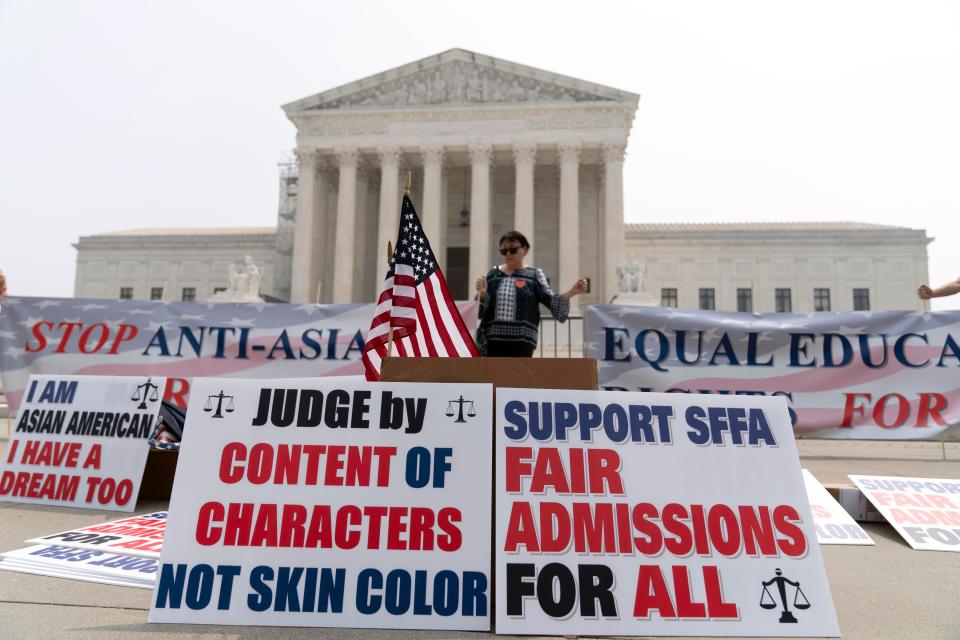Supreme Court rules to end affirmative action, moving US in the right direction
The Supreme Court's decision on Thursday to effectively end affirmative action at America's universities was the right one. Determining who is admitted to the nation's top schools based on students' racial and ethnic backgrounds was itself a form of discrimination.
There are two reasons to celebrate this decision: the legal victory and the moral one.
The Supreme Court erred greatly in 2003, when in Grutter v. Bollinger it decided to uphold the University of Michigan Law School’s use of race-based admissions policies. The justices' reasoning in that case was that because schools review a wide array of factors, no application is accepted or denied based only on race.
However, the Grutter decision failed to recognize that if race is used as a factor to decide whether a person gets into the college of their choice, it will inevitably become the determining factor in at least some cases. The elevation of one group based on their race necessarily means that another group is hindered because of their race.

The 14th Amendment clearly prohibits such a practice, and the court's decisions on Thursday in cases involving Harvard and the University of North Carolina highlighted that using race as a reason to reject some applications is unconstitutional.
“Respondents’ race-based admissions systems also fail to comply with the Equal Protection Clause’s twin commands that race may never be used as a 'negative' and that it may not operate as a stereotype,” Chief Justice John Roberts wrote. “College admissions are zero-sum, and a benefit provided to some applicants but not to others necessarily advantages the former at the expense of the latter.”
The use of affirmative action in college admissions primarily hurt Asian Americans, who at Harvard University have had higher average test scores than any other racial group, yet the lowest rate of admissions.
Universities can still promote diversity of experience and perspective
Race-based admissions was a crude tool that colleges have used to pursue what they are truly after, which is diversity of experience. Eliminating affirmative action will do nothing to hinder diversity of perspective and doesn’t preclude racial experience from being considered as one part of an application.
Students can still use their college essays to discuss their experience growing up as a member of a racial group, what challenges that upbringing posed and how they overcame any discrimination that stood in their path. Those topics are compelling expressions of character and perspective and can highlight the value of diversity.
“A benefit to a student who overcame racial discrimination, for example, must be tied to that student’s courage and determination," Roberts wrote. “Nothing in this opinion should be construed as prohibiting universities from considering an applicant’s discussion of how race affected his or her life.”
Proponents of affirmative action argue that without it, historically marginalized groups will suffer in the admissions process. But that doesn't have to be the case.
Another view: Supreme Court ends affirmative action in admissions. Colleges will be whiter for it.
Schools should curtail use of legacy admissions
Universities should reevaluate their use of favorable admission standards for legacy students, athletes and the children of donors. Those groups tend to be disproportionately white. If universities truly want to improve ethnic and racial diversity on campuses, they should scale back the use of legacy and other special admissions standards to open more slots for a broader range of students.
Opinion alerts: Get columns from your favorite columnists + expert analysis on top issues, delivered straight to your device through the USA TODAY app. Don't have the app? Download it for free from your app store.

The court delivered an important victory Thursday for Americans who believe that students should not be denied attending their dream schools because of their race or ethnicity. History will mark it as another important step in America’s journey toward racial equality.
Dace Potas is an Opinion fellow for USA TODAY. A graduate from DePaul University with a degree in Political Science, he's also president of the Lone Conservative, the largest conservative student-run publication in the country, and has also written for National Review, Just The News, The College Fix and others.
You can read diverse opinions from our Board of Contributors and other writers on the Opinion front page, on Twitter @usatodayopinion and in our daily Opinion newsletter. To respond to a column, submit a comment to letters@usatoday.com.
This article originally appeared on USA TODAY: Affirmative action was crude tool. Supreme Court is right to end it


